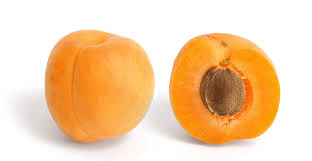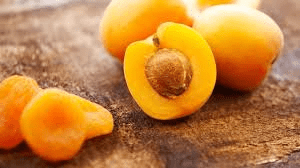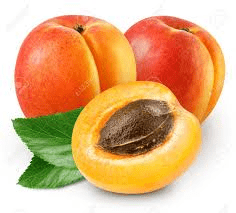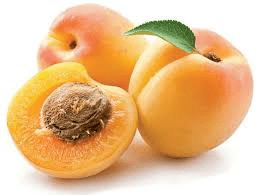Apricot fruits, belonging to the species Prunus armeniaca, are cherished for their sweet flavor, vibrant color, and nutritional benefits. Native to Asia, apricots have been cultivated for thousands of years and are now grown in various regions around the world. The fruit is a drupe, which means it has a fleshy part surrounding a single hard seed or pit.
The apricot tree is relatively small, reaching heights of about 15 to 20 feet. It thrives in temperate climates and requires well-drained soil and a period of winter chilling to produce fruit. Apricot trees blossom in early spring, and the flowers are usually white or pink. The fruit begins to develop shortly after flowering and ripens in the summer.
Apricots are known for their bright orange or yellow skin, which can sometimes have a reddish blush. The flesh inside is soft and sweet, with a flavor that is often described as a blend of peach and plum. The fruit is typically eaten fresh but is also enjoyed dried, canned, or as an ingredient in various culinary dishes.
Nutritionally, apricots are a rich source of vitamins and minerals. They are particularly high in vitamin A, which is important for eye health and immune function. Apricots also provide vitamin C, potassium, and dietary fiber. The fruit contains antioxidants such as carotenoids, which help protect the body from oxidative stress and may reduce the risk of chronic diseases.
In addition to their nutritional value, apricots offer several health benefits. The fiber content aids in digestion and can help maintain a healthy digestive system. The antioxidants present in apricots contribute to overall health by combating free radicals and reducing inflammation. Apricots are also low in calories and fat, making them a healthy snack option.
Apricots have various culinary uses. Fresh apricots can be eaten on their own or added to salads, yogurt, and desserts. Dried apricots are popular as a snack or ingredient in baked goods and trail mixes. Apricot preserves, jams, and jellies are common ways to enjoy the fruit year-round. Additionally, apricots are used in savory dishes, often paired with meats like chicken or pork to add a touch of sweetness and complexity.
Growing apricots requires careful attention to the tree’s needs. They are susceptible to certain pests and diseases, including aphids, fungal infections, and bacterial cankers. Proper care, including pruning, pest management, and soil maintenance, is essential for healthy apricot trees and high-quality fruit production.
Apricots have a rich history and cultural significance in many parts of the world. In some cultures, apricots are associated with prosperity and are used in traditional dishes and festivals. They are also featured in various medicinal practices, where they are used to treat ailments such as digestive issues and respiratory conditions.
Apricot fruits are not only delicious but also offer numerous health benefits and versatile culinary applications. Whether enjoyed fresh, dried, or as part of a dish, apricots remain a beloved fruit with a long history of cultivation and use. Their combination of flavor, nutrition, and adaptability makes them a valuable addition to any diet.
The Economic Importance and Uses of Apricot Fruits

1. Culinary Uses: Apricot fruits are widely used in culinary applications, including fresh eating, jams, sauces, and baked goods. Their sweet and slightly tangy flavor makes them a popular choice for desserts, salads, and preserves. For example, apricot jam is a common spread for bread and toast.
2. Nutritional Benefits: Apricots are rich in vitamins A and C, potassium, and dietary fiber. They provide essential nutrients that support overall health, including immune function, skin health, and digestion. Consuming apricots can help meet daily nutritional needs.
3. Juices and Beverages: Apricot fruits are used to produce a variety of beverages, including apricot juice, nectar, and liqueurs. These products are enjoyed for their refreshing taste and nutritional benefits. Apricot juice, for instance, is a popular drink in many countries.
4. Dried Apricots: Dried apricots are a convenient and nutritious snack, with a concentrated flavor and extended shelf life compared to fresh apricots. They are used in trail mixes, baking, and as a topping for cereals and salads.
5. Flavorings and Extracts: Apricot fruits are processed into flavorings and extracts used in a range of products, including baked goods, candies, and ice creams. These extracts enhance the taste of various food items.
6. Cosmetics and Skincare: Apricot oil and extracts are used in cosmetics and skincare products for their moisturizing and anti-aging properties. Apricot kernel oil, for instance, is used in facial creams and body lotions.
7. Health Supplements: Apricot seeds, also known as apricot kernels, are sometimes used in health supplements. They contain compounds that are believed to have potential health benefits, although their use is controversial and should be approached with caution.
8. Traditional Medicine: In some traditional medicine practices, apricot fruits are used for their purported therapeutic properties. They are believed to support digestive health, improve circulation, and promote overall well-being.
9. Animal Feed: Apricot by-products, such as the pulp left after juice extraction, can be used as animal feed. They provide a source of nutrients for livestock and are often incorporated into feed formulations.
10. Culinary Innovations: Apricots are featured in innovative culinary creations, including gourmet dishes and fusion recipes. Their versatility allows chefs to experiment with new flavor combinations and presentation styles.
11. Baking Ingredients: Apricot fruits are used in baking to add flavor and moisture to cakes, pastries, and bread. Apricot puree, for example, is a popular ingredient in cakes and muffins.
12. Preserves and Canning: Apricot fruits are preserved through canning to extend their shelf life and provide a year-round supply. Apricot preserves and canned apricots are used in various culinary applications.
13. Food Coloring: Apricot extract is sometimes used as a natural food coloring agent. It provides a subtle orange hue to products without the use of synthetic dyes.
14. Culinary Sauces: Apricot fruits are used to make sauces that complement savory dishes. Apricot glaze, for example, is used as a topping for meats and poultry.
15. Nutraceuticals: Apricot extracts are used in nutraceuticals for their potential health benefits. These products aim to provide therapeutic effects and support health beyond basic nutrition.
16. Gardening and Landscaping: Apricot trees are grown for their aesthetic value in gardens and landscapes. They offer attractive blossoms and fruit, contributing to the beauty of outdoor spaces.
17. Economic Impact: The cultivation and sale of apricot fruits have significant economic impact in regions where they are grown. Apricot farming supports local economies and provides income for farmers.
18. Export Opportunities: Apricot fruits and products have export potential, providing opportunities for international trade. Countries with apricot production can supply global markets with fresh and processed apricot products.
Read Also: Appearance and Features of Yellow Perch Fish
The Products and By-products That Can Be Derived From Apricot Fruits

1. Fresh Apricots: Consumed raw or used in a variety of recipes, fresh apricots are enjoyed for their sweet flavor and nutritional benefits.
2. Dried Apricots: Produced by removing moisture from fresh apricots, dried apricots are a nutritious snack and ingredient in various dishes.
3. Apricot Juice: Extracted from fresh apricots, apricot juice is a refreshing beverage that retains many of the fruit’s nutrients.
4. Apricot Jam: Made by cooking apricots with sugar, apricot jam is a popular spread for bread and a filling for pastries.
5. Apricot Sauce: A versatile sauce made from apricot puree, used in both sweet and savory dishes to enhance flavor.
6. Apricot Extract: Concentrated flavoring derived from apricots, used in baking, candies, and beverages to impart apricot flavor.
7. Apricot Oil: Extracted from apricot kernels, apricot oil is used in skincare products for its moisturizing and nourishing properties.
8. Apricot Kernels: The seeds inside apricots, used in health supplements and sometimes as a source of oil.
9. Apricot Puree: Made by blending apricots into a smooth consistency, used in baking, sauces, and baby food.
10. Apricot Preserves: Canned apricots or apricot preserves are used as a topping or ingredient in various dishes.
11. Apricot Glaze: A sauce made from apricot juice and sugar, used to glaze meats and pastries.
12. Apricot Flavored Liqueurs: Alcoholic beverages infused with apricot flavor, enjoyed as cocktails or on their own.
13. Apricot Pie Filling: Prepared apricot mixture used as a filling for pies and tarts.
14. Apricot Tea: Made from dried apricot pieces or apricot-flavored tea blends, enjoyed for its unique flavor and potential health benefits.
15. Apricot Powder: Dried and ground apricots used as a flavoring or nutritional supplement in various food products.
16. Apricot Cider: Fermented beverage made from apricot juice, offering a fruity alternative to traditional apple cider.
17. Apricot Ice Cream: Frozen dessert flavored with apricot puree or extract, providing a refreshing treat.
Read Also: The Appearance and Features of Trout Fish
Frequently Asked Questions (FAQ’s) About Apricot Fruits

1. What are the nutritional benefits of apricot fruits? Apricot fruits are rich in vitamins A and C, potassium, and dietary fiber. They support immune function, skin health, and digestion.
2. How are apricots used in cooking? Apricots are used fresh, dried, or in processed forms such as jams, sauces, and baked goods. They add sweetness and flavor to a variety of dishes.
3. Can apricot kernels be consumed? Apricot kernels contain compounds that are sometimes used in health supplements. However, they should be consumed with caution due to potential toxicity.
4. What is apricot juice used for? Apricot juice is consumed as a refreshing beverage and is also used in cocktails, smoothies, and culinary sauces.
5. How can dried apricots be used? Dried apricots are used as a snack, in trail mixes, as a baking ingredient, or as a topping for cereals and salads.
6. Are apricot extracts used in cosmetics? Yes, apricot extracts are used in cosmetics for their moisturizing and anti-aging properties.
7. What are apricot preserves? Apricot preserves are made by cooking apricots with sugar, resulting in a sweet spread used on bread or as a filling in pastries.
8. How are apricot kernels processed? Apricot kernels can be processed to extract oil or used in health supplements. They require careful handling due to potential health risks.
9. Can apricot fruits be used in savory dishes? Yes, apricot fruits can be used in savory dishes, such as apricot glaze for meats or apricot-based sauces.
10. What is apricot puree used for? Apricot puree is used in baking, sauces, baby food, and as a flavoring ingredient in various recipes.
Read Also: Basic 7-minute Workout Routines and It’s Intricacies

